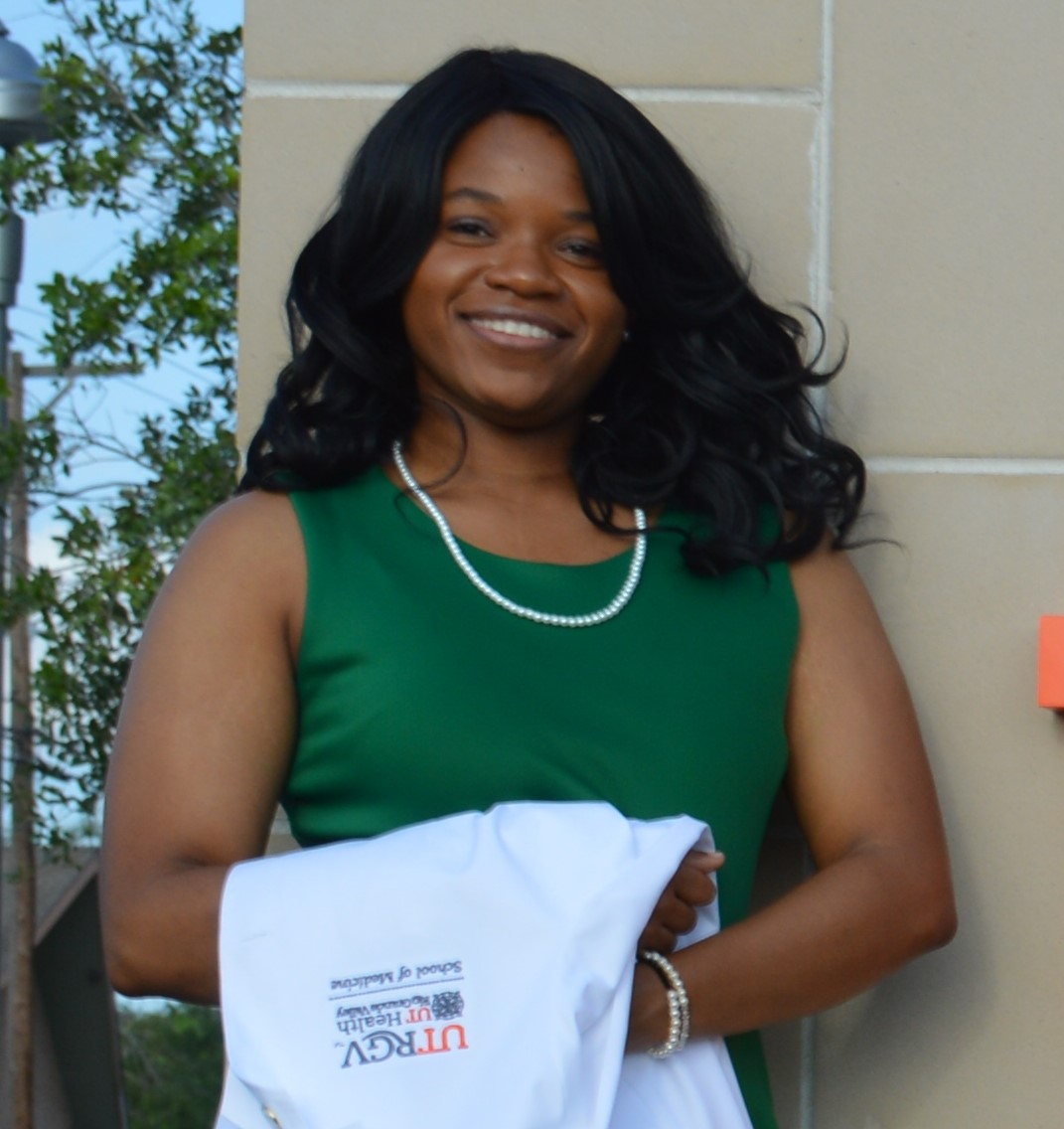By Saira Cabrera
RIO GRANDE VALLEY, TEXAS – SEPT. 13, 2023 – Courtney Austin spent her childhood in the doctor's office, where they made her feel she could do anything she put her mind to.
Oddly enough, she wasn't really aware that she was deaf and might have limitations.
d/Deaf refers to an individual who identifies as being deaf, with the lowercase "d" indicating that they have a significant hearing impairment.
"As a d/Deaf child, it was easy to think something was wrong with me. I was not like the other kids and did not act like them," said Austin, now a third-year medical student in the UTRGV School of Medicine. "But, I spent a lot of time with physicians who made me feel like I could do and be anything."
AS FULFILLING AS MEDICINE
Her childhood experiences motivated her to consider medicine as a career and to not allow her deafness to dictate what she could do.
"I was inspired to consider medicine by spending my childhood in the doctor's office," she said. "I thought everything they did was incredible."
For a time, she admits, she thought medicine would not be a good fit for her.
"And I tried to find the same passion and joy in other things, but nothing was as fulfilling as medicine," Austin said.
The turning point was when she and her father were in an accident and it took nearly a year for her father to fully recover from his injuries.
"In that year, I experienced the highs and lows of patient care and advocacy and the moans and groans of our healthcare system," she said. "It inspired me to take the initiative in my goals and use that experience to make a difference, whether large or small."
'A FUN LITTLE MYSTERY'
Inspired to address issues in the healthcare system, Austin focused on otolaryngology – a surgical subspecialty that manages head and neck conditions – to help combat how poorly technology has moved toward creating equal access for people of all abilities.
"The ear is a fun little mystery. This interest comes from my experience as a d/Deaf patient," she said. "The last few years have shown how little is known regarding hearing loss and perception, especially among the general population and ENTs (ear, nose and throat physicians)."
Learning the differences between her hearing or lack thereof gives Austin better insights into what other physicians might not be able to understand or contribute, she said.
"Having a d/Deaf perspective in otolaryngology could help improve patient experience and encourage a greater understanding of D/deafness and how it impacts individuals," she said.
FOR VALLEY d/Deaf POPULATIONS
The UTRGV School of Medicine has provided Austin with patient exposure from day one and allowed her to conduct investigations that could lead to possible treatments.
"By taking a deep dive into research and applying it to myself, I was able to better program my own hearing devices – which has remarkedly improved my hearing and speech perception," she said. "Imagine what we could do for so many others with hearing devices who have struggled or been impacted by hearing loss. This could help disadvantaged and disabled communities through evidence-based medicine."
Austin's research efforts focus on establishing more patient access to health resources in the Valley, particularly that of the deaf population. Her path has led her to completing research involving speech perception in subjects who rely on the simultaneous use of both a hearing aid and a cochlear implant – a device that bypasses damaged portions of the ear and directly stimulates the auditory nerve.
"This research will lead to a greater understanding of spectral and perceptional cues and how hearing devices can be better programmed to assist rather than cure hearing loss," she said.
She also is finishing up a project examining the benefits of bimodal stimulation on speech perception in hearing-impaired populations, and soon will start another speech perception project that looks at pitch shifts in cochlear implant subjects and how they may relate to the perception of vowels.
"I also hope to start a community health project that looks at the resources available to the deaf population here in the Valley," she said. "Research can make a difference, and I look forward to positively impacting my community."
The UT Health RGV's Ear, Nose, & Throat and Audiology departments will participate in the Second Annual Deaf and Hard of Hearing Awareness Walk, a free event on Sept. 30 to help raise awareness and provide support to the d/Deaf community of the Rio Grande Valley.
ABOUT UTRGV
The University of Texas Rio Grande Valley (UTRGV) was created by the Texas Legislature in 2013 as the first major public university of the 21st century in Texas. This transformative initiative provided the opportunity to expand educational opportunities in the Rio Grande Valley, including a new School of Medicine and a School of Podiatry, and made it possible for residents of the region to benefit from the Permanent University Fund – a public endowment contributing support to the University of Texas System and other institutions.
UTRGV has campuses and off-campus research and teaching sites throughout the Rio Grande Valley including Brownsville (formerly The University of Texas at Brownsville campus), Edinburg (formerly The University of Texas-Pan American campus), Harlingen, Weslaco, McAllen, Port Isabel, Rio Grande City and South Padre Island. UTRGV, a comprehensive academic institution, enrolled its first class in the fall of 2015; the School of Medicine welcomed its first class in the summer of 2016, and the School of Podiatric Medicine in the fall of 2022.

